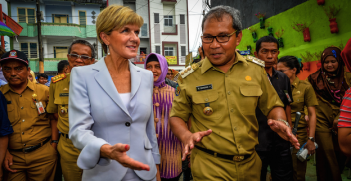Slavery in Supply Chains: Time for Business to Step Up

Today, in globalised economies, modern slavery permeates all industries and manifests in different forms of forced and exploitative labour conditions. As an umbrella term, modern slavery includes practices such as human trafficking, forced labour and slavery-like practices such as debt bondage, sale or exploitation of children and forced or servile marriage. This includes underpaid factory workers, children labouring in the fishing, mining and cocoa sectors and men working in brick kilns, tied to their employer through years of generational debt. While varied in nature, all involve one person depriving another person of their liberty, in order to exploit them for personal or commercial gain.
A recent report from the International Labour Organisation (ILO), Profits and Poverty: The Economics of Forced Labour, estimates the annual profits generated from forced labor to be $150 billion. The report also identifies that 90% of forced labour in the world occurs in the private economy. Modern slavery in the private economy violates many fundamental human rights including freedom of movement, freedom of association, free choice of employment and extreme but not uncommon cases, freedom from torture or cruel, inhuman or degrading treatment or punishment.
Yet, the Global Slavery Index estimates that, somewhere in the world today, there are nearly 30 million people in modern slavery. While every country in the world has outlawed slavery, it still exists in each and every one.
What does slavery in supply chains look like?
Today, modern slavery sometimes still takes the form of buying and selling of human beings. The Guardian exposé of human trafficking in the Thai fishing industry reveals the horrendous condition of men sold for the equivalent of AU$600 and forced to work years at sea with little to no pay. More widespread is victims of modern forms of slavery controlled through a combination of more subtle means. This includes:
- Payment of high recruitment fees that results in a situation of debt bondage;
- Retention of passports and identity documents that limits freedom of movement;
- Working excessive overtime beyond legal or code of conduct limits;
- Misinformation about the nature of work and unlawful contract changes; and
- Undocumented migrants threatened with notification of authorities if they leave employment without permission.
When considered as such, it is not surprising that companies could well find these practices in their supply chains. It is not easy to identify, however, and can exist in a complex web of sub-suppliers, sub-contractors, multiple tiers deep and across multiple jurisdictions.
To put this in perspective, in the 2012-2013 financial year, Fortescue Metals Group (FMG) spend on projects and operations combined exceeded over $10 billion. FMG’s supply chain extends to around 3000 suppliers in 19 countries mainly across Australia, Asia and Europe. In 2012 a social audit was conducted on a major supplier in the Middle East to investigate the labour and living conditions of workers. Through the auditor’s detailed interviews with a sample of over 100 workers, a confronting fact emerged: there were people in FMG’s supply chain whose passports were being held, and who effectively couldn’t leave their jobs because of debts they had paid to agents. Through a failure to check recruitment practices and its passport practices, FMG’s supplier was creating the conditions ripe for modern slavery.
How to address modern slavery in supply chains?
Businesses must come to the table and realise that they are a crucial stakeholder in eliminating modern slavery around the world. To operationalise their commitment companies must:
- Update policy frameworks (Code of Conduct, supplier policy, request for tender documents, among others) to incorporate international labour standards and modern slavery clauses. This must be applicable not only to employees but suppliers, subcontractors and other business partners;
- Undertake due diligence processes through in-depth supply chain mapping exercises to identify high risk industries, countries and spend suppliers. “It’s too complex to know,” is no longer an excuse;
- Conduct social audits on high risk suppliers to verify that the company’s practices and performance is in line with the company’s code of conduct against modern slavery;
- Develop needs based supplier capacity development programs to help noncompliant suppliers redress violations through corrective action plans. Companies should understand the leverage they have over suppliers to effect positive change;
- Train procurement specialists on identifying the risk factors of forced labour during the tender process. Among many options available, the Charted Institute of Procurement Specialists (CIPS) offer an online course on Ethical Procurement and Supply; and
- Concurrently, performance standards for procurement staff needs to be updated to ensure social targets are evaluated alongside the typical deliverables of code, quality and delivery.
It is paramount for businesses and business leaders to be honest, transparent and accountable for what goes on in their supply chains.
There is a gap in formation on practical actions recommended for business leaders on what to do to address the issue of modern slavery in supply chains. To answer these queries and engage more readily with businesses, the Walk Free Foundation has launched Tackling Modern Slavery in Supply Chains: A Guide 1.0 that outlines step-by-step what companies can and must do to eliminate slavery from their business, while providing practical guidance and tools that businesses, governments, organisations and non-profits can start implementing immediately.
Businesses must be supported in these efforts by robust laws that create an enabling policy environment for businesses to address slavery in supply chains. This includes supply chain transparency laws, like the California Transparency in Supply Chain Act, and legislating on the import of goods and services tainted with forced labour, such as the United States (US) Tariff Act of 1930. The Tariff Act is now being called into effect to stop the import of Uzbekistan Cotton into the US. Leading by example, governments must also take the steps to slavery-proof public procurement processes.
Alongside governments and civil society, businesses have an imperative to clean up their supply chains and afford workers across the global economy the most basic human right, an existence worthy of human dignity.
Peter Nicholls is the CEO of Global Business Authentication at the Walk Free Foundation.
Laura McManus is a Researcher at the Walk Free Foundation.
The Walk Free Foundation is an organization attempting to end modern slavery and human trafficking.





